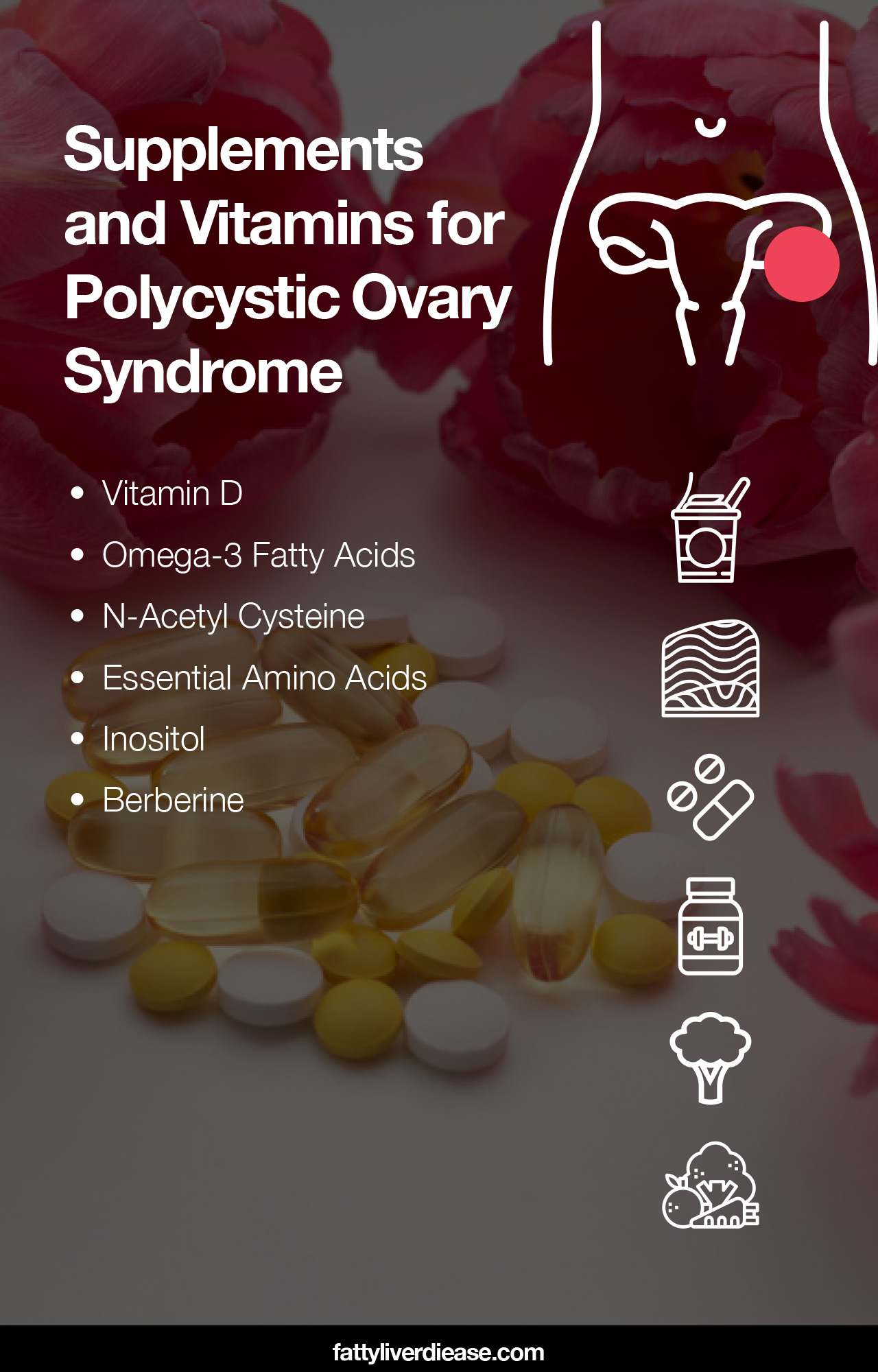Polycystic ovary syndrome (PCOS) is a common hormonal condition that impacts premenopausal women. If you have PCOS, you may be experiencing frustrating and painful symptoms like excess hair growth, irregular periods, and infertility. However, you are not alone, and there are steps you can take to successfully manage and treat PCOS. If you’re looking for PCOS natural treatment strategies, then you’ve come to the right place. Here we go through everything you need to know about diet, supplements, and vitamins for polycystic ovary syndrome.
Read on to find out about natural remedies for PCOS, including supplements, vitamins, and diet changes.
What You May Experience with PCOS
Polycystic ovary syndrome or polycystic ovarian syndrome (PCOS) is a condition that causes hormonal imbalances, especially in women of childbearing age. High testosterone levels are one of the key characteristics of PCOS that causes numerous symptoms. Though women normally produce a small amount of androgens, women with PCOS often have hyperandrogenism.
Symptoms of PCOS include:
- Hirsutism: Hirsutism describes excess hair growth on the face, chest, and other areas of the body.
- Acne: High androgens may cause acne on the cheeks and jawline.
- Irregular periods: Many women with PCOS experience an irregular menstrual cycle. Some PCOS patients may have a period every few months, while others may not have a period at all.
- Ovarian cysts: Many women with PCOS have numerous cysts or follicles on their ovaries, which are visible with ultrasound imaging.
- Infertility: Because of imbalanced hormone levels, women with PCOS often do not ovulate regularly. Irregular or lack of ovulation causes difficulty conceiving.
The Connection Between PCOS and Metabolic Conditions
PCOS is associated with metabolic dysfunction, in addition to endocrine imbalances. Metabolic conditions are also risk factors for developing PCOS. Women with PCOS often also suffer from conditions like:
- Insulin resistance
- High insulin levels or hyperinsulinemia
- High blood glucose levels
- High blood lipid levels
- High cholesterol
- Type 2 diabetes
- Fatty liver disease
- Obesity

Supplements and Vitamins for Polycystic Ovary Syndrome
Here are a few dietary supplements and vitamins to consider adding to your regimen if you have PCOS.
1. Vitamin D
Vitamin D deficiency is common across the general population, including women with PCOS. Low levels of vitamin D are connected to metabolic dysfunction, inflammation, and bone conditions.
Vitamin D is naturally present in only a few foods like mackerel, salmon, eggs, and mushrooms. Certain foods like cereal and yogurt are often fortified with vitamin D. The body also synthesizes vitamin D in response to sun exposure.
Because vitamin D is difficult to obtain from dietary sources, vitamin D supplementation may be the most effective method for increasing vitamin D levels. Vitamin D supplements work best when taken with calcium and magnesium, to enhance absorption.
2. Omega-3 Fatty Acids
Are you wondering how to lower androgen levels in female naturally? Omega-3 fatty acids may help. PCOS patients may benefit from supplementing with omega-3 fatty acids. Omega-3 fatty acids are healthy polyunsaturated fats that have a potent anti-inflammatory effect on the body. Research shows that omega-3 supplementation may balance testosterone levels in women with PCOS. (1) Plus, getting plenty of omega-3 fatty acids helps cells throughout your body function smoothly and repair from damage.
Omega-3 fatty acids can be found in both plant and animal sources. The plant form is called alpha-linolenic acid (ALA) and is present in foods like flaxseeds, chia seeds, pecans, and walnuts. There are two animal forms of omega-3 fatty acids: eicosapentaenoic acid (EPA) and docosahexaenoic acid (DHA). EPA and DHA are found in fatty fish like salmon, mackerel, sardines, and Arctic char.
Taking a spoonful of high-quality fish oil every day is an excellent strategy for ensuring that you’re getting the omega-3s that your body needs to fight inflammation, balance hormones, and improve metabolic function.
3. N-Acetyl Cysteine
N-acetyl cysteine (NAC) functions as a powerful antioxidant in the body and can be taken as a supplement. A meta-analysis and systematic review published in Obstetrics and Gynecology International determined that NAC supplementation was associated with a higher likelihood of pregnancy and ovulation, in comparison to women taking a placebo. (2) However, researchers determined that more randomized controlled trials and clinical trials are needed to confirm the therapeutic effect of NAC for PCOS. (2)
4. Essential Amino Acids
Essential amino acids may be effective PCOS supplements. Essential amino acids are crucial for nearly all physiological processes, including the production of muscle tissue, connective tissue, hormones, and enzymes. Getting optimal ratios of essential amino acids is important for supporting metabolic function and hormonal function.
In fact, research has shown that women with PCOS have imbalanced levels of essential amino acids in the blood. (3) Supplementing with balanced ratios of essential amino acids may have therapeutic potential for managing PCOS.
Amino acids are building blocks of protein and therefore can be obtained from dietary sources. However, it can be challenging to ensure that you’re getting optimal ratios of essential amino acids every day, making supplementation very helpful.
5. Inositol
Inositol is a sugar-like compound produced by the body that plays a role in facilitating hormone function and signaling throughout the body. Because inositol may help hormones do their job better, it may have a therapeutic impact on PCOS. Inositol can be found in many foods like oranges, broccoli, cantaloupe, and beans. It can also be taken in supplement form.
6. Berberine
Berberine PCOS supplements may help mitigate symptoms and improve metabolic function. Berberine is a potent antioxidant found in certain fruits and plants. Research reveals that berberine supplementation may play a role in improving insulin resistance and fertility in women with PCOS. (4)
PCOS-Friendly Diet Changes
Supplements and vitamins work best when combined with a healthy, anti-inflammatory diet. Here are a few steps you can take to help mitigate PCOS symptoms.
Stay Away from Added Sugars and Refined Grains
Added sugars have been isolated from their original source and added to manufactured food products. Refined grains have undergone processing to remove the protein, fiber, and vitamins from the grain, leaving the starchy end product.
Removing refined grains and added sugar from your diet stabilizes blood sugar levels, reduces inflammation, encourages weight loss, and facilitates stable hormone levels and healthy metabolic function. To limit added sugars and refined grains, stay away from foods like ice cream, soda, candy, pastries, white rice, white bread, and white pasta.
Limit Your Saturated Fat Intake
Limiting your saturated fat intake plays an important role in improving metabolic syndrome and PCOS. Saturated fat is found in fatty meat and dairy products, like steak, bacon, whole milk, butter, cream, and cheese.
Eating too much saturated fat disrupts the communication between insulin and insulin receptors, leading to high blood sugar and weight gain. High consumption of saturated fat over a long period of time is also associated with high cholesterol levels, high blood triglycerides, and a higher risk of cardiovascular disease.
Eat Loads of Fruits and Vegetables
Fruits and vegetables are packed with antioxidants, vitamins, minerals, and fiber that help reduce systemic inflammation and oxidative stress. Aim to incorporate fruits or vegetables into every meal and snack. Examples of fruits and veggies to add to your diet include broccoli, celery, spinach, kale, sweet potato, apples, blueberries, and cherries.
Medical Interventions
In addition to vitamins, supplements, and dietary changes, there are several effective medications that your physician may recommend to manage PCOS. Here are a few medications:
- Metformin: Metformin is effective in lowering insulin levels, increasing insulin sensitivity, improving blood sugar levels, and managing PCOS symptoms.
- Clomiphene: This medication facilitates ovulation in women with PCOS, helping to treat infertility.
- Spironolactone: Spironolactone helps manage symptoms associated with high androgen levels.
- Birth control: Oral contraceptives contain progesterone and estrogen and can help balance hormones and regulate periods.
Things to Keep in Mind
Make sure that you visit your healthcare provider and discuss all diet changes and supplements. It’s important to follow all medical advice, to ensure that you’re taking the right steps for your health. PCOS may be treated by your internist or specialists in endocrinology or obstetrics and gynecology.
Conclusion: Supplements and Vitamins for Polycystic Ovary Syndrome
PCOS is a hormonal disorder that affects millions of women in the United States and causes symptoms like hirsutism and infertility. However, PCOS can be successfully managed and treated with diet changes, supplements, and medications. Supplements like essential amino acids, inositol, and omega-3 fatty acids may help reduce inflammation, encourage healthy hormone function, and improve overall health and wellness.
References:
(1) https://www.ncbi.nlm.nih.gov/pmc/articles/PMC3941370/
(2) https://www.ncbi.nlm.nih.gov/pmc/articles/PMC4306416/























